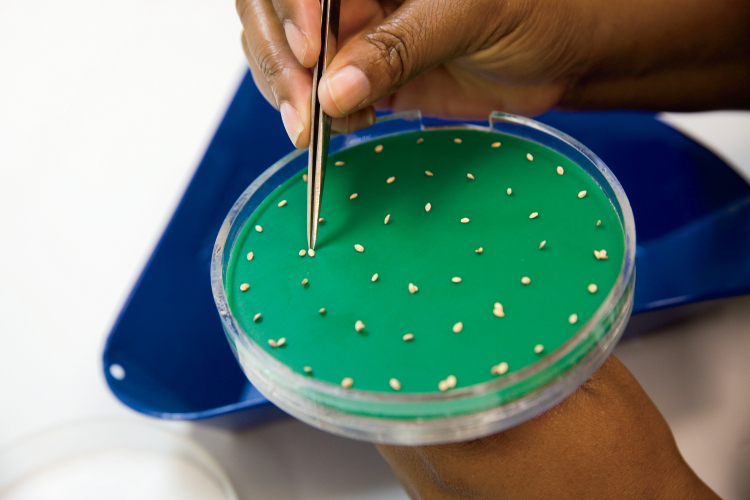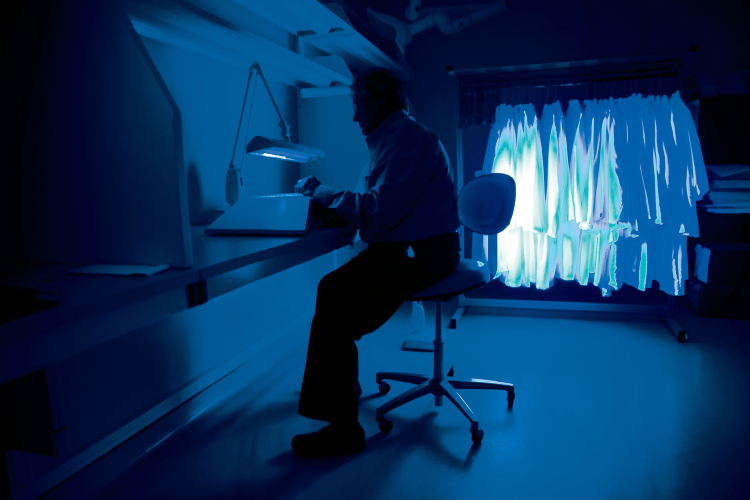Home > Georgia > Georgia Technology > The Science of Georgia Seeds
The Science of Georgia Seeds
Georgia’s top crops from its booming $71 billion agriculture industry started as a seed. And since the late 1940s, the Georgia Department of Agriculture’s Seed Laboratory in Tifton has played an important role in verifying that seeds sown by farmers successfully germinate to yield crops and profit.
“Protecting consumers, whether farmers or homeowners, to ensure that they are getting the seed they paid for is what we are here for,” explains Reuben Beverly, director of the Laboratory Division. “Any seed that is offered for sale can be tested.”
The Georgia Department of Agriculture’s Seed, Fertilizer and Feed Section of the Plant Industry Division is responsible for setting rules and regulations related to seeds, fertilizer and animal feeds, making sure that labeling is accurate and that the items reach the minimum quality standards for being offered or transported for sale in Georgia. They also license seed, investigate arbitration complaints and supervise seed inspectors.
Inspectors visit farm supply stores, nurseries, hardware stores and other seed distributors throughout the state to collect samples for testing. They also check seed packets currently at the locations to make sure they’re properly labeled and that the weight is correct.
All bags of seeds, whether flower, vegetable, agricultural or grass, must bear a label that details the country of origin, its species and the percentage of germination. State statutes establish the official germination rate for each species – standard peanuts must have a 70 percent germination, peas an 80 percent germination and rosemary a 30 percent germination – and the Seed Laboratory tests whether the label’s guaranteed germination matches what would actually occur once planted.
Testing the germination rate involves pulling samples from an unopened bag and placing the seeds in optimal conditions for germination to occur, such as on a moist medium like a paper towel in an appropriate temperature. Germination can take seven to 10 days, but some species require up to 30 days. Even grass seed used in lawns undergoes this testing, though it’s considerably more challenging to test because of multiple species and soil amendments, Beverly says. Not only is the germination rate tested, samples are also screened for noxious weed seeds.
The germination of a seed can be affected by factors such as storage time and environmental conditions including heat, light and moisture, so state seed law requires that seeds being sold have a tag showing the test date and can be marketed for up to nine months after the date.
If the sample’s germination rate does not match the label’s guaranteed germination, a stop sale of the seed is issued. The dealer could choose to relabel its product or divert the seed for other use, such as feed, but Beverly explains that “in general, most of our seed [that is sold] is high-quality. Conscientious businessmen will not want to sell a defective product.”
Georgia farmers and seed dealers can submit a seed sample to the lab for testing by following a few simple steps, which can be found on the Department of Agriculture’s website. One to two pounds of any large seed, such as soybeans, peanuts or corn can be tested and usually takes about two to four weeks for testing to be completed, depending on the seed kind.
With the lab testing about 20,000 to 25,000 samples per year, Beverly says the challenge is balancing sample volume with turnaround time so that crops may be planted on time. But they are well-equipped to handle such a load in their new state-of-the-art facility, which he proudly describes as “probably one of the best seed-testing facilities in the southern region, if not in the nation.”





